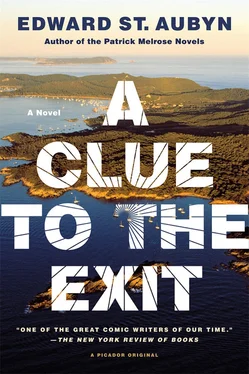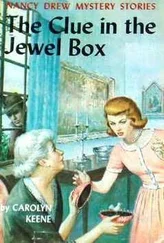‘Hang on…’ said Patrick.
To my fury, when I finally felt that things were beginning to hot up on the train, Angelique came to tell me that it was time to go to Jimmy’s nightclub with Alessandro and his party.
There I was one moment, struggling with a matter of intense personal importance, which also happens to be one of the great scientific questions of the age — the other being the origins of the universe — and the next I was in the back of Alessandro’s limousine, trying not to drown in the billows of inanity which splashed over me from every direction.
‘Hang on,’ Patrick had said, and I could remember that he was about to make a key point, to take us further into the labyrinth, but I could no longer remember what he was going to say. I sat staring hysterically at this hiatus. ‘What’s next?’ I might have asked, but without Jean-Paul’s playfulness. What the fuck was next? Hang on … Hang on … Hang on for what? I had to hang on until I was back in the casino tomorrow.
I noticed that I had, incidentally, turned into a tangential gambling addict, unable to pursue my life’s vocation except in a casino, watching Angelique play. What had happened to Patrick’s thought? Where do thoughts come from when they ‘pop up’, and where do they go when they ‘disappear’?
I looked at Angelique with a vehement sense of betrayal; she looked back at me with the innocent cruelty of a baby panther. I realized that I had attributed all kinds of passionate and tormented reflections to her which she would never dream of having. She really knew the trick of living in the present, from one splash of pleasure to another. Perhaps her sexual intensity derived from her shallowness and not from the depths of tragic knowledge I had projected on her, or perhaps this superficiality was itself profound, born of the knowledge that everything is surface. I no longer knew what to think, but I needed to be in her bed, to see if I could find freedom again in her treacherous embrace.
‘After you, after you,’ said Alessandro.
‘I haven’t been to a nightclub in yonks,’ said the Englishwoman.
‘“Yonks”,’ chuckled Xavier. ‘ Maravilloso! ’
On the dance floor, tame tax exiles tried to look wild. Big-boned boys in blazers lassoed the air above carefully cropped heads. Old men with tinted lenses and years of syphilis under their belts consorted with frigid models. Sharp-faced blonde girls kept their favours for the sons of Industry, and big-nosed Greek girls sat around gloomily being chaperoned by whoremongering brothers. They didn’t let just anybody in.
I sat down on a velvet bench and through all the smoke and the bad music and the undesirable desire I suddenly allowed myself to become relaxed. Even here there was no need to posture. The essential question remained the same. Where could I find freedom in this situation? I looked around and felt reconciled with all the people in Alessandro’s party and all the people in the room. I could spray adjectives at them for the rest of the evening, but in the end they were just people struggling to be happy with only the most unpromising material at their disposal.
‘ Maravilloso ,’ said Xavier.
‘ Si ,’ I said. ‘ Es maravilloso .’
Angelique looked at me, and I could see in her eyes that she understood the breakthrough I had made. She is not only dead sexy, but probably the wisest person I’ve ever met.
‘But why would a morphogenetic field have to be discarnate?’ asked Patrick. ‘Why couldn’t it be a genetic inheritance?’
‘The rapid accumulation of cultural and behavioural habits cannot be explained genetically,’ said Jean-Paul, ‘because the geneticists insist that behaviour does not modify the genome. Adaptation can only occur through the slow, blind process of natural selection, shaped by the accidental mutations which give a slight reproductive edge to their carriers.’
‘Anyway,’ said Crystal, ‘the extension of the theory into “morphic resonance” completely blows the genetic connection. After the first crystallization of a solution, which may be very long and difficult, the process grows easier and easier, even in laboratories remote from each other, where no exchange of information or crystals has taken place. The solution exists in a field that is becoming increasingly grooved and tilted towards crystallization.’
‘These grooves of habituation,’ said Jean-Paul, ‘are what Sheldrake calls “creodes”.’
While Jean-Paul and Crystal tried to establish the reality of this phenomenon for Patrick, he was already preoccupied with its implications at another level. When the world was read in terms of habits, time lost its bald authority. It consisted of endlessly, organically altering textures: of crystals which formed faster and faster but, as they did so, formed more and more conservative fields, of islands of novelty erupting and then, as related habits formed around them, becoming archipelagos, stretching back towards continents of deep habit. Time itself was in an evolutionary frame. This idea pressed in on him confusedly as he tried to map it over his own subjective sense of change.
‘Time looks very different,’ he managed to say incoherently.
‘Ah, yes,’ said Jean-Paul with an appreciative smile. ‘Our insistence that a second is a second is a second is a formality which may be useful for making lunch appointments, but not for understanding the true nature of reality.’
‘It’s not even that useful for making lunch appointments,’ said Crystal.
I had to stop working to have dinner with my adorable Angelique.
The only creode I’m helping to establish is casino writing, and I hope I can make a modest contribution to literature by preparing a morphogenetic field for the next dying novelist who tries to push his plot forward in this gilded setting. Perhaps I can do more, and all over the world, to the despair of their managers, casinos will start to fill with coughing authors, stooped over their notebooks or holding X-rays up to the chandeliers and neon flamingos to remind themselves why they can’t afford to stop working.
Before we had dinner, Angelique lost another half million. Ten of our twenty-five million is gone, and if her luck doesn’t change we only have another fifteen days together. Some people might think it pedantic not to carry on after the money has run out, and for a while I found myself wavering on this point, but Angelique is right to be adamant. There might seem to be something touchingly human about spending the last four months of my life with the woman I love, being reassured, being nursed (when she’s not at the casino), introducing her to fish fingers; but imagine the mediocrity of such a resignation after we have strapped ourselves to the wheel, after we have distilled time in the retort of our unbreakable contract, so that each moment we spend together falls, drop by drop, like liquid fire on to our outstretched and writhing tongues.
Yes, Angelique is definitely right. Besides, she might win, and then our extraordinary happiness will hold.
I try to challenge that happiness to see if it is false. Am I wedding myself to Fortune because it is the unreliable sidekick of a reliably nasty Fate? Parting from Angelique is almost as terrifying as death, and yet I expect to survive it. Am I using her as a training ground for extinction, manfully putting the pistol to my temple and firing a blank?
No, on the contrary, the two endings enhance each other: leaving her body and leaving my own body have become as beautifully entwined as entering her body with my body.
Читать дальше












